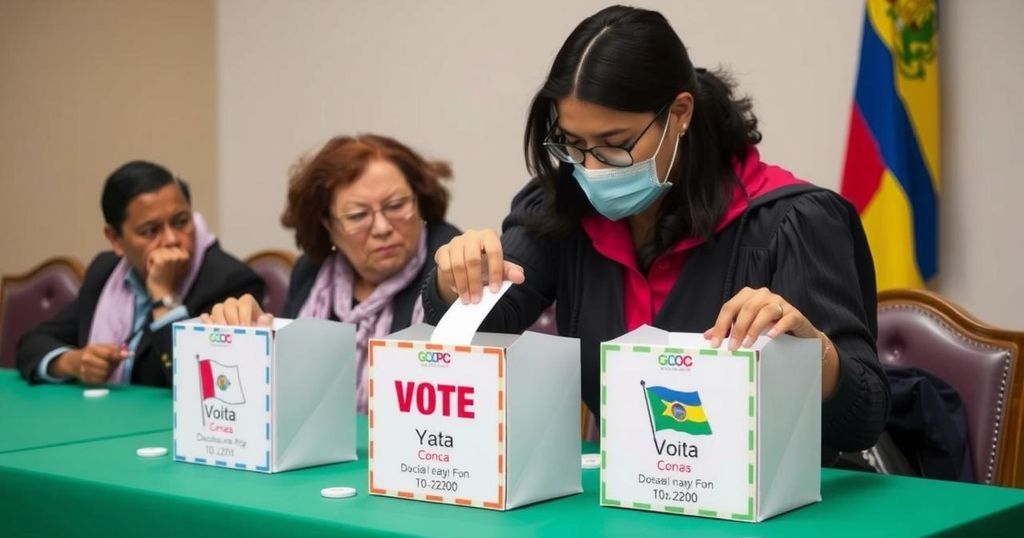World news
ANDRES MANUEL LOPEZ OBRADOR, ASIA, ASSOCIATED PRESS, BOLIVIA, CONSTITUTIONAL COURT, CORRUPTION, CUBA, DEMOCRACY, EL SALVADOR, ELECTIONS, EV, EVO MORALES, GOVERNANCE, LATIN AMERICA, LOPEZ OBRADOR, LUIS ARCE, MEXICO, NORTH AMERICA, PHILIPPINES, SOUTH AMERICA, THE ASSOCIATED PRESS
Jamal Robinson
0 Comments
Bolivia Prepares for Divisive Judicial Elections Amid Political Strife
Bolivia is conducting judicial elections for the third time, marking a contentious political event. Campaigning is banned, yet candidates are finding creative ways to gain visibility. The election has drawn criticism for its potential to politicize the judiciary and undermine its integrity. Recent political tensions between President Luis Arce and former President Morales have complicated the election process, raising concerns about democracy in Bolivia.
Bolivia is gearing up for a contentious judicial election, the campaign for which has been muted due to restrictions on public campaigning. Nonetheless, candidates have creatively sought exposure through advertising, attaching their images to snack products and embedding messages in official materials to familiarize themselves with voters, many of whom feel detached from the process. This election, unlike any other worldwide, allows citizens to vote for their top judges, but as many observers caution, this format may politicize the judiciary, compromising its independence and integrity.
Former Bolivian president Evo Morales initiated the current electoral system in 2009, which replaced a qualification-based nomination process with popular elections for the judiciary. This shift has been criticized for diminishing judicial impartiality and transforming court positions into political tools, leading to widespread apathy among voters. A majority express disinterest in a system that many perceive as corrupt.
The upcoming election marks only the third round since this judicial experiment began. With only four of the nine seats on the Constitutional Court available for election, the remaining judges continue serving without re-evaluation. Low turnout is expected, as seen in previous elections, where many ballots were cast blank or null due to frustration with an opaque selection process dictated by Morales’ associates.
Political tensions have escalated leading up to this election, particularly between current President Luis Arce and Morales. Recent maneuvering by the Constitutional Court, perceived as extending the terms of aligned judges, raised alarm over the integrity of the judicial process. As the Inter-American Court of Human Rights criticized these delays, concerns grew about the long-term implications for Bolivian democracy and judicial independence. This election is keenly observed by Mexico, where a judicial overhaul is underway, possibly affected by the outcomes of Bolivia’s electoral experience.
The unique system of electing judges in Bolivia has become a critical focal point for debates on governance and democratic integrity. Observers remain watchful as the country proceeds with this election amid skepticism and underlying political strife.
Bolivia stands as the only nation currently allowing citizens to elect their judiciary leaders directly. This unique practice has drawn scrutiny, with critics arguing it adversely affects the impartiality of judicial functions by intertwining politics with the judiciary. The election system was implemented by Evo Morales in 2009 and has faced ongoing challenges, including political manipulation and a perceived decline in the rule of law. Recent political conflicts, particularly regarding the upcoming elections, have drawn international attention, especially from countries like Mexico considering similar judicial reforms.
In conclusion, Bolivia’s judicial elections are fraught with controversy, revealing deep-seated political divides and widespread voter apathy. The country’s experiment with directly elected judges has raised critical questions about judicial independence and electoral integrity. Political maneuvering has intensified around this election, highlighting the precarious balance of power within Bolivian politics. The potential implications of this process are being closely monitored, especially by other nations examining their own judicial systems.
Original Source: www.voanews.com




Post Comment